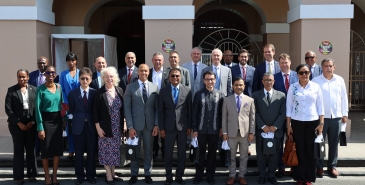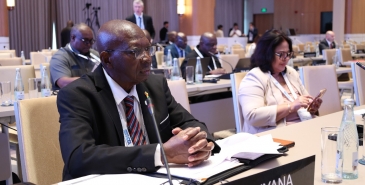The Service Commissions
Speech delivered at: 21st Sitting- Tenth Parliament - 13 June, 2012
13 June, 2012
8783
Mr. Ramjattan: I am very happy to hear the Hon. Prime Minister indicated that as a matter of principle they have absolutely no objection to these constitutional bodies which had at their entire intent and propose to independently do the work of ensuring the appointment, disciplining and dismissal of members within the Judicial Service Commission, the Police Service Commission, the Teaching Service Commission and the Public Service Commission. I am rather happy and feel that it is a good spirit indeed that he even went on further to indicate that there is precedent in Trinidad and Tobago as to how we can operationalise the administrative independence of these constitutional bodies.
What this motion seeks to do is to ensure, what I feel was obviously an error in not placing them in, that these four constitutional bodies are placed in that schedule of our Constitution of article 222A. That is the Third Schedule. But there is absolutely nothing which prevents or prohibits the administrative financial independence of these bodies from coming into existence, notwithstanding the fact that they are not in the Third Schedule. The Third Schedule, indeed, states very explicitly that the entities should be the Ethnic Relations Commission, Human Rights Commission, Rights of the Child Commission, Judicial Service Commission and the Office of the Auditor General. It does not have these four constitutional commissions. But to give administrative independence requires, what is called, an independence of its financing. The fact that the Hon. Prime Minister indicated this is so, it logically means then that we ought to give it at, this National Assembly, this legislative branch, teeth to that independence.
No where does this motion states that there have been violations of the Constitution. We are not saying that here. This is not stating anything to that effect. What is being sought to be resolved is that this National Assembly henceforth treats these commissions as autonomous bodies just as those which are explicitly stated in the Third Schedule and to effectively, without having it stated in our Constitution, in the schedule, state that indeed they are autonomous administratively. That is basically what it is. Now if we are in agreement that no political authority or the executive branch must direct and control these bodies, what then is wrong with the logical step of giving them administrative independence?
Nothing is wrong! A Constitution that is silent on it does not necessarily mean that it prevents it from happening. Because of that vacuum created by its non-statement in Schedule Three we must now give it meaning by ensuring that we operationalise it. I want to say that there is some criticism that it has not been done and what it has caused is that there can be people who are big time politicos, and I see one right in front of me, the Hon. Member, Mr. Ganga Persaud. He used to be in the Public Service Commission. [Member: Chairman.] And he is still Chairman, I think. It could not be. What I am saying here is that there can be people who innately or politically head these Service Commissions. Inherent in that is a bias [Interruption] Moreover, apart from the appointments being politicised, I want to make it clear that sometimes, what is called the people that are supposed to come under the regime of a public service or a police service commission, and take for example Mr. Ramnarine recently, the Police Service Commission did not go to his assistance. So people are being interfered with by the politicos like the Minister of Home Affairs and they do not have those people who are supposed to be, in every respect, immunised or insulated from these statements by the politicos, just remain dumb. Why do they remain dumb? It is because they do not have the administrative independence that this motion seeks to give them. So because they probably feel that they are not going to get in next year’s budget if they come out and support, say a David Ramnarine; they will not get enough moneys for them to run their Commission, so they just remain silent. Although they might be proper men and women who can have a judicatory independence, they are somewhat neutralised by administrative non-independence. That is what this is all about. I am urging then because it is not as if we do not have, what we would call, the precedent in and around. I am very happy that the Prime Minister indicated that Trinidad has it. We also have a series of what can be a system to operationalise in the Audit Act in relation to the Auditor General. But we still have these constitutional bodies which were supposed to be independent from the control of the Executive being budget agencies. If we want to see them having that administrative independence, they should come out from the list of budget agencies just like the Supreme Court, the Auditor General’s Office and such like. I feel that there is no need to delay the process by saying, “Let us go now to the Constitutional Reform Committee of the Parliament.” A constitutional amendment is not needed to give teeth to what is called an administratively independent operationalising of a body like this.
I then, on behalf of the Alliance For Change, indicate that, as stated in the motion, there is tremendous support for it and there is no need to delay the process, frustrate this exercise and operationalisation through the process as mentioned by the Hon. Speaker. I support the motion as is.
Thank you very much. [Applause]
Speech delivered by:
What's New

16 April, 2025
Speaker of the National Assembly Hosts Luncheon and Tour of Public Buildings for Diplomats

08 April, 2025
Minister Kwame McCoy promotes Low Carbon Development Strategy in IPU Committee Meeting on Sustainable Development

07 April, 2025
Speaker Nadir Emphasises Guyana’s Commitment to Social Development at IPU General Debate

07 April, 2025
Clerk of the National Assembly Attends ASGP Plenary Meetings during the 150th IPU Assembly in Tashkent, Uzbekistan

